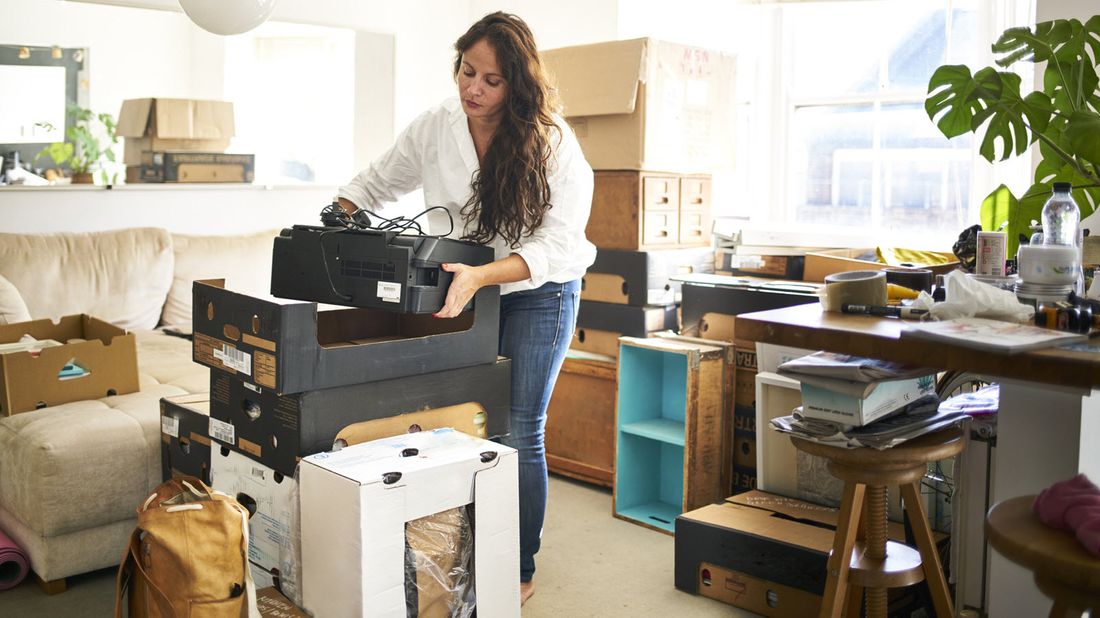Why Clutter Can Affect Your Finances — and Health

Take a second to look around the rooms in your home. Do you see ordered, Zen-like scenes, or is each room its own cluttered, daunting to-do list?
It’s no secret that Americans have a love affair with stuff. By one estimate, the average home in the U.S. contains over 300,000 things — from thumbtacks to automobiles. Although the size of the average American family has shrunk from 3.3 people to 2.6 in the past 50 years, our houses have nearly doubled in size. And what are we doing with all that added space? We’re filling it with stuff.
This spring, a thorough decluttering may be one of the best favors you can do for yourself. That’s because all those trinkets and 25-year-old magazine issues aren’t just limiting your storage capacity. Here’s how clutter can affect your finances and health.
STUFF IS STRESSFUL
When you get stressed, your body produces a hormone known as cortisol, and chronically elevated cortisol levels in the bloodstream are associated with increased risk for heart disease, depression, impaired memory, anxiety, weight gain and more. Our stuff isn’t helping.
A UCLA study found that women who described their homes as cluttered or in need of organizing tended to have higher levels of cortisol in their bloodstream throughout the day. Saliva tests taken in the morning indicated they woke up feeling stressed and they finished the day in the same frame of mind (researchers didn’t see the same thing with men). But stuff impacts men and women similarly on other fronts. Several studies have linked cluttered surroundings to a propensity to procrastinate, general feelings of dissatisfaction and an inability to concentrate.
These studies all have a common thread: Home is our comfort zone, but when home is chaotic, we find other avenues to comfort. A cluttered kitchen, for example, encourages us to eat packaged foods and easy meals rather than clean the room and then prepare a meal.
When we have too much stuff it’s also harder to concentrate, because everything we own occupies space in our memory. We all have obscure objects we haven’t used in years, but we probably know where find most of them if prompted. University of Toronto researchers posit that all this “mental clutter” reduces our short-term memory and makes us less efficient at processing information in real time — it makes everything a little more difficult. Rather than crafting a budget, updating a resume or other tasks that take some time and concentration, clutter indirectly pushes us to get comfy, turn on Netflix and tune it all out.
STUFF IS EXPENSIVE
Your stuff didn’t just appear. At some point, you paid money for most of those things. That’s an obvious cost, but there are additional hidden costs to clutter.
While we keep a pretty good mental inventory of all the items we own, it’s not perfect. If you have too much stuff, you may not find an item that you need — perhaps because it’s buried deep in an unmarked Rubbermaid container. Where’d that paint brush go? What about that curry powder you need for a recipe? After you waste time looking, you just buy another paint brush or jar of curry powder. Lo and behold, a month later the lost items turn up. Clutter increases the risks of these “duplication” costs.
Gift cards (you know, free money) can easily fall to the bottom of drawers where they lay dormant until they expire. Important financial paperwork can drift into the cluttered void, until years later when you need a copy of your birth certificate or Social Security card. You'll probably pay a fee for new copies of official documents. A misplaced bill can rack up late fees if it’s out of sight and out of mind (pro tip: go digital). These may all seem like small expenses, but they can add up quickly.
Plus, think of all the time we waste (our most valuable resource) looking for lost stuff. It’s estimated we’ll spend up to 10 minutes every day just looking for misplaced keys, a computer file, phones and other belongings you put somewhere we didn't intend. That amounts to thousands of hours over a lifetime.
When it comes time to move, think of all the boxes you’ll need to buy. What size truck will you need to rent? And if you don’t want to do it yourself, you can pay movers an hourly rate to get it from point A to B. However, the more stuff you have, the more boxes you’ll need, the bigger the moving truck, the more hours professional movers take to…move it. It’s perhaps not surprising that self-storage is now a $38 billion industry growing 7 percent annually. Today there's more than 5 square feet of self-storage available for every man, woman and child in the U.S.
CUTTING TIES
It’s not easy to part ways with our stuff. The same areas of the brain activated when we feel pain and discomfort are also active when we part ways with our belongings. To make it easier, one of the best ways to start cleaning house is to recruit a friend so you don’t touch the stuff you’re getting rid of.
So, call up a friend and make a point to declutter this year! Your mind, body and finances will thank you.
Related Articles
Take the next step.
Your advisor will answer your questions and help you uncover opportunities and blind spots that might otherwise go overlooked.
Let's talk






